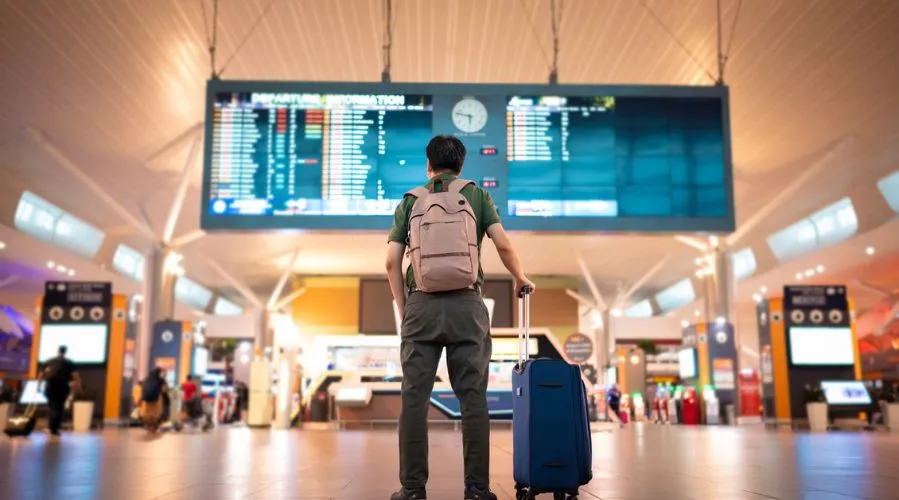France is the most visited country in Europe today. Moreover, it consistently ranks as one of the most popular tourist destinations on Earth. And with good reason.
First off, there’s Paris — i.e., the Eiffel Tower, the Louvre, Notre Dame, and Disneyland. But there’s also lesser-known gems like the multimedia theme-park Futuroscope and Limoges — the country’s ceramic capital. There’s Versailles, Brittany, Bordeaux, Nice, and Lyon. The beaches of the French Riviera and the peaks of the French Alps. Plus the food, the wine, and the historically rich and exquisitely unique culture like no other. And if you’re planning a voyage to France too, we’ve got some tips to help make your trip a safe one.
- What documentation do I need to visit France?
- What COVID restrictions does France have?
- What health risks should I be aware of?
- General safety and security tips
- Local laws and customs
- Should I get travel insurance when visiting France?
- Why choose AXA travel insurance?
What documentation do I need to visit France?
France is part of both the Schengen Zone and the EU. So depending on your country of origin, you may need a visa to enter its borders. Citizens of the U.K., Canada, and the U.S., for example, do not need a visa for stays of up to 90 days, while citizens of China, India, Nepal, and South Africa do. You can learn exactly what paperwork you’ll need on France’s official government visa website. But, generally speaking, you’ll need the following:
- A valid passport (issued less than 10 years before and valid for at least 3 months after departure);
- Proof of accommodation (for the duration of your stay);
- Proof of sufficient funds;
- Your itinerary;
- A letter of invitation (if applicable);
- A valid visa (if applicable);
- A travel insurance certificate (if applicable; more on that below).
See if you do need a Schengen visa for France (and/or its Schengen neighbors).
What COVID restrictions does France have?
A COVID certificate, negative test result, and/or reason for travel are no longer required to enter France (or its overseas territories) — regardless of where you’re coming from.
Masks are still highly recommended in places like hospitals and retirement homes. But they are also no longer mandatory.
But the rules can still change, so be sure to check the latest info on the official Re-Open EU page.
What health risks should I be aware of?
Like any large nation, France has its health concerns. For example, according to the World Health Organization, smoking, alcohol consumption, and low physical activity remain important public health issues. Cardiovascular disease and cancer are two of the leading causes of death among the population. And, like most European nations, France was hit rather hard by the recent COVID pandemic.
That said, France still has one of the highest life expectancies in the world (around 82 years old). In part due to its world-renowned healthcare system. Plus a relatively healthy diet (at least portion-wise).
The food — both at restaurants and from the shops — is generally safe to eat (and usually delicious). The tap water is usually safe to drink too — although boiling is never a bad call. And France also happens to be a world leader in renewable energy — which ranks its levels of pollution among the lowest in Europe.
In short, if you’re in good health, you should be ok. But make sure any routine vaccines are in order. Pack a basic medical kit. And remember that having travel medical insurance is always a good call too.
And if you’re sick, have a pre-existing condition, and/or are pregnant, consult with your doctor before traveling.
For medical emergencies when in France, call #112 or #15.
General safety and security tips
On a global scale, France is a relatively safe country. Still, there are certain things to be aware of during your trip.
Strikes and demonstrations
Strikes and protests can lead to disruptions in public services, as well as an enhanced security presence. And demonstrations can at times turn violent.
So be diligent, monitor local media for the latest info, and follow the instructions of local authorities.
Terrorism
Terrorism remains a threat in Europe — including France, and particularly Paris. And while the French government has several counter-terrorism measures in place to protect the public, you should always be aware of your surroundings. Especially when in public places and attending large gatherings.
You can learn more about the terrorist threat in France from the French Ministry of the Interior (just use an online translator).
Crime
Petty crime such as pickpocketing and theft can be quite common — especially in popular tourist destinations like Paris* and Marseille. Be extra careful in the metro.
Illegal taxis are a major issue too, charging unsuspecting tourists much more than a fair rate.
Break-ins and “smash and grab” robberies can also occur.
Violent crime is rare. However, it does happen (for example, there was a wave of needle-spiking attacks in nightclubs across France in 2022).
And credit card, ATM fraud, and cybercrime are also not uncommon.
So it’s important that you remain diligent throughout your travels — whether in big cities or small towns.
*You can learn more about staying safe in Paris from the Préfecture de police de Paris.
The number for the police throughout France is #17 (and #112 for emergencies in general).
Public transportation
Public transportation is reliable and fairly simple to navigate. But be sure you validate and keep your ticket — the authorities often do random checks.
Driving
French roads are well maintained. Still, drive carefully. Especially if you’re coming from the States — as it’s a whole new ball game. In certain cases, your driver’s license may have to be accompanied by an official translation in French or an international driving license. More information can be obtained from French embassies and/or consulates. And respect the Highway Code.
NOTE: Big French cities can get extra crowded. Safely maneuvering e-scooters and bikes has, therefore, been increasingly tricky too (with people sometimes landing in the hospital). So no matter how you choose to get around — be extra careful.
Recreational activities
French coastal waters can get rough, particularly so in winter. So know your beach flags (they go from green to purple). Stay informed regarding the latest weather warnings. And use diligence — whether boating, swimming, or just strolling along the shore. If need be, translate and consult France’s Ministry’s of the Sea official surveillance and rescue page.
Hiking, climbing, or skiing the French Alps? Be prepared too. Trails are not always marked. And weather conditions can change rapidly — even in the summer. And in the winter, heavy snowfall can lead to low visibility, impassable roads, and even avalanches.
No matter the activity — make sure you’re adequately equipped, aware of your environment and the latest weather conditions, and prepared to act fast. Avoid going solo, and stick to the beaten path.
You can get the latest info on mountain conditions in France (in French) from ANENA — i.e., “Association nationale pour l'étude de la neige et des avalanches.”
PRO TIP: Get a full list of emergency phone numbers for France here.
Local laws and customs
Despite somewhat popular belief, naming your pig ‘Napoleon’ is technically not illegal in France. However, it’s important that you familiarize yourself with the country’s actual laws and customs before your visit. Here are some of the more common ones to know.
- If asked by the authorities, you must be able to prove your identity (via a passport, a photo driver’s license, and so on).
- Concealing your face in public places is illegal. This includes balaclavas, full veils, or any other garments or masks (minus the COVID ones, obviously).
- Illegal drug use carries stiff penalties. If you are found in possession of illegal drugs, you can be held in detention for several months or even years.
- You can’t take certain food products into the EU (i.e., France). The European Commission website offers detailed rules about taking food and drink into the EU.
- Smuggling in counterfeit goods (such as a fake Rolex) can also land you an enormous fine and/or time in jail.
Learn more about French customs on the Republic’s official customs page.
Should I get travel insurance when visiting France?
If you need a Schengen visa, then you’re going to need travel insurance. But even if you don’t, travel insurance is never a faux pas.
Because whether you’re sunbathing on the French Riviera, meeting French Mickey Mouse, trying escargots for the first time, scaling the Eiffel Tower, skiing down Mont Blanc, or anything in between — you never really know what to expect. And it’s better to be safe than sorry.
Medical costs abroad can be very expensive. And if something does go wrong, the right travel insurance will help make sure you don’t break the bank when it comes to medication, hospitalization, repatriation, and so on.
Why choose AXA travel insurance?
There are many reasons to choose AXA travel insurance for your trip to France.
First off, it’s quick, easy, affordable, and can be done online in minutes.
If you do need a Schengen visa, AXA’s plans meet all the necessary requirements. Moreover, they cover not only France but all 27 Schengen territories (and beyond). And if your visa is denied, the plans are refundable in most cases (as long as you provide the proper documentation).
The AXA certificate is accepted at all Schengen embassies and consulates.
The AXA certificate can be downloaded and printed instantly.
Depending on your particular trip, you can choose from 3 different AXA plans:
- Our Basic plan meets all the requirements necessary for a Schengen Visa, covers medical expenses of up to €30,000 in France (and all other Schengen countries), and offers coverage in case of hospitalization or repatriation.
- AXA Essential meets all Schengen Visa requirements, and covers medical expenses of up to €100,000 across the Schengen Area. It can also cover things like the loss of documents and/or valuables, and a number of other problems you might run into.
- Our most comprehensive plan, Annual, for a full year’s coverage. It’s perfect for anyone planning to travel to France (and throughout the Schengen area and other countries in Europe ) regularly.
You can get a free quote for a plan that works best for you here.
With AXA, you and your family will have peace of mind during your trip, ensuring you have a much safer bon voyage.
Related articles on France
- Do I need a visa to travel to France?
- Do I need travel insurance to visit France?
- France travel insurance for U.K. nationals
- How to apply for a France visa from India?
Are there any COVID restrictions for visiting France?
No. As of late 2022, all COVID restrictions for visiting France have been lifted. But be sure to check with Re-Open EU for the latest info.
Is France part of the EU?
Yes. France is one of 27 members of the European Union. It’s also a member of the Eurozone (and its currency is, therefore, the Euro).
Is France part of the Schengen Zone?
Yes. France is also one of the Schengen member states.
AXA already looks after millions of people around the world
With our travel insurance we can take great care of you too
AXA Schengen's Travel Insurances

AXA Schengen Basic
AXA Schengen Basic is perfect to obtain your Schengen visa. This travel insurance meets all the requirements demanded, covers you in all the countries of the Schengen Area as well as 4 European microstates (Andorra, Vatican City, Monaco and San Marino).

AXA Schengen Essential
AXA Essential is perfect to obtain your Schengen visa. It provides coverage in all the Schengen countries + the European microstates + all the EU countries (including UK, Cyprus and the Republic of Ireland). And you get additional guarantees compared to AXA Schengen Basic.

AXA Schengen Annual
AXA Annual is perfect to obtain your Schengen visa. This annual travel insurance is ideal for those who often travel to Europe as well as multiple-entry Schengen visa holders. You get the same guarantees as AXA Schengen Annual for different countries during 90 days.


